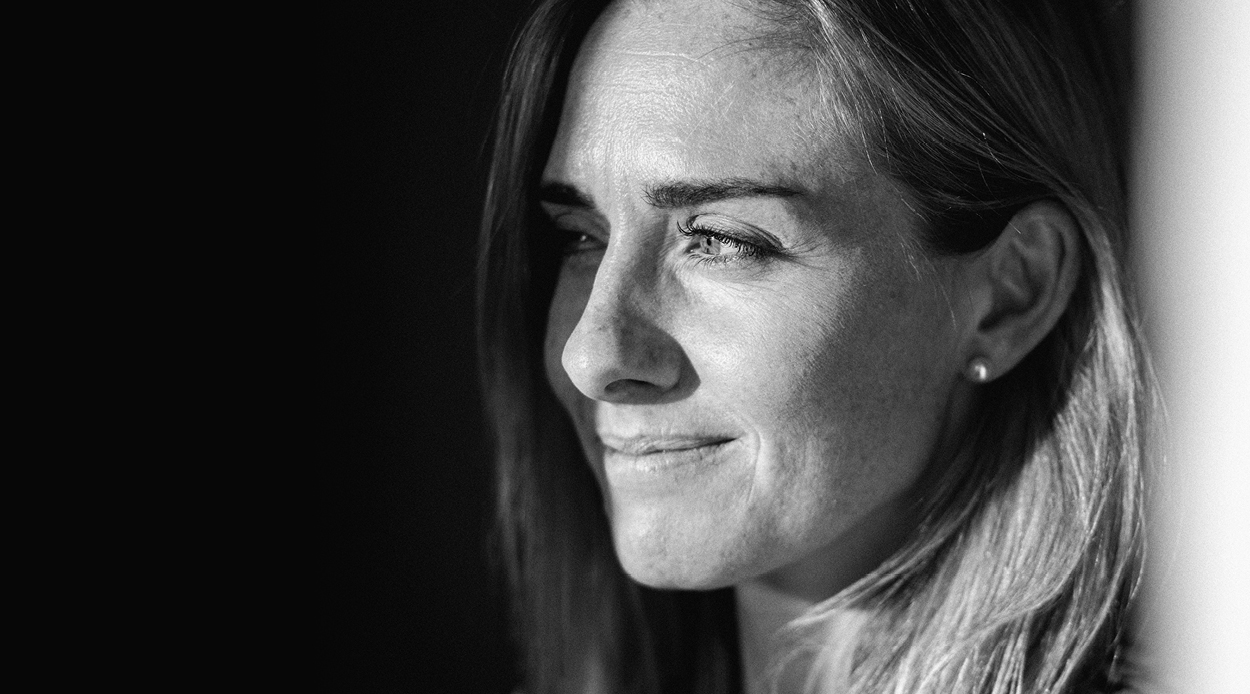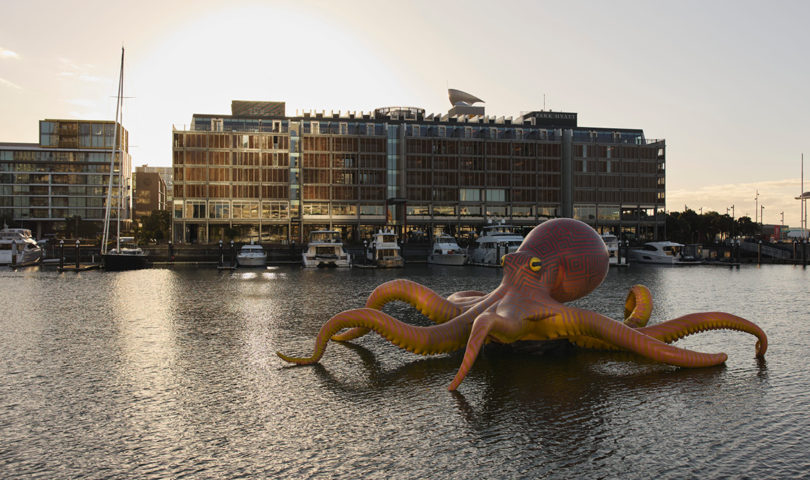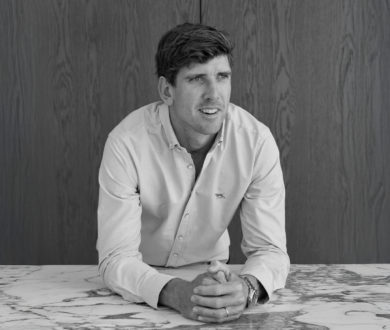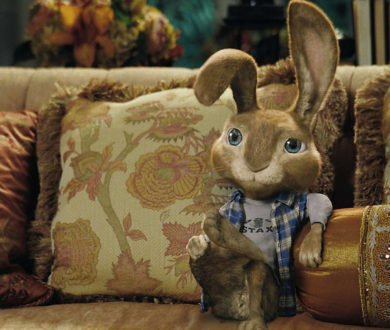On the 15th of August, 2021, the world watched with apprehension as U.S. troops withdrew from Afghanistan and the Taliban seized its capital — shifting governing power for the first time in almost 20 years. For New Zealand journalist and reporter Charlotte Bellis, who covered Afghanistan for the last four years with Qatar-based network Al Jazeera, it was a surreal day at the ‘office’, but one she took in her stride with characteristic resilience. Originally from Christchurch, Bellis has been a key conduit on the ground in Afghanistan and garnered global praise after she pressed the Taliban on women’s rights in the organisation’s first official press conference. Here, the indomitable journalist gives us an insight into her world, from her upbringing to her day-to-day on the job, and shares her honest thoughts on why the international approach to the Taliban needs to change for Afghanistan to prosper.
Ed’s note: Since the original publication of this feature in print, Bellis has resigned from Al Jazeera. This interview was included in Denizen’s Summer issue in November, 2021.
I was basically mute as a child. I spoke through a doll named Molly, so if anyone said “hello Charlotte”, I’d lift up the doll and say “hello” back. When I got to school they said I needed speech and drama classes so I did that until I was 18. It’s quite surreal to think they helped me get from being too shy to speak, to my job now.
Growing up in Christchurch, my dad was a sheep farmer and my mother was at home. Neither of them had much interest in international news or affairs. We just watched the 6pm News each night and read the Press newspaper each morning. I moved to the U.S. after high school and there became more interested in global politics and conflict.
Most people remember where they were on 9/11. I was in high school and I remember it vividly. I think that made quite an impact on me, watching what happened afterwards and seeing it on our news. I always wanted to be a journalist and I think that sowed the seed for pursuing international news in my twenties.
My father was competitive and I had a fairly regimented childhood. From when I was five, I was playing tennis multiple hours a day, before school and after school; then after tennis, I did homework for a few hours before bed. He, and my tennis coaches, instilled in me the concept of goal setting and not giving up, and that’s been really valuable in my adult life.
I feel privileged to be in Afghanistan at this time. I’m really proud of Al Jazeera. I think we’ve done a good job of being at the forefront of all the big moments and portraying things in a balanced way. For me personally, it’s been years in the making. I’ve been with Al Jazeera for five years, and in Afghanistan for four years and it’s been a lot of relationship-building and hustle to get to this point.
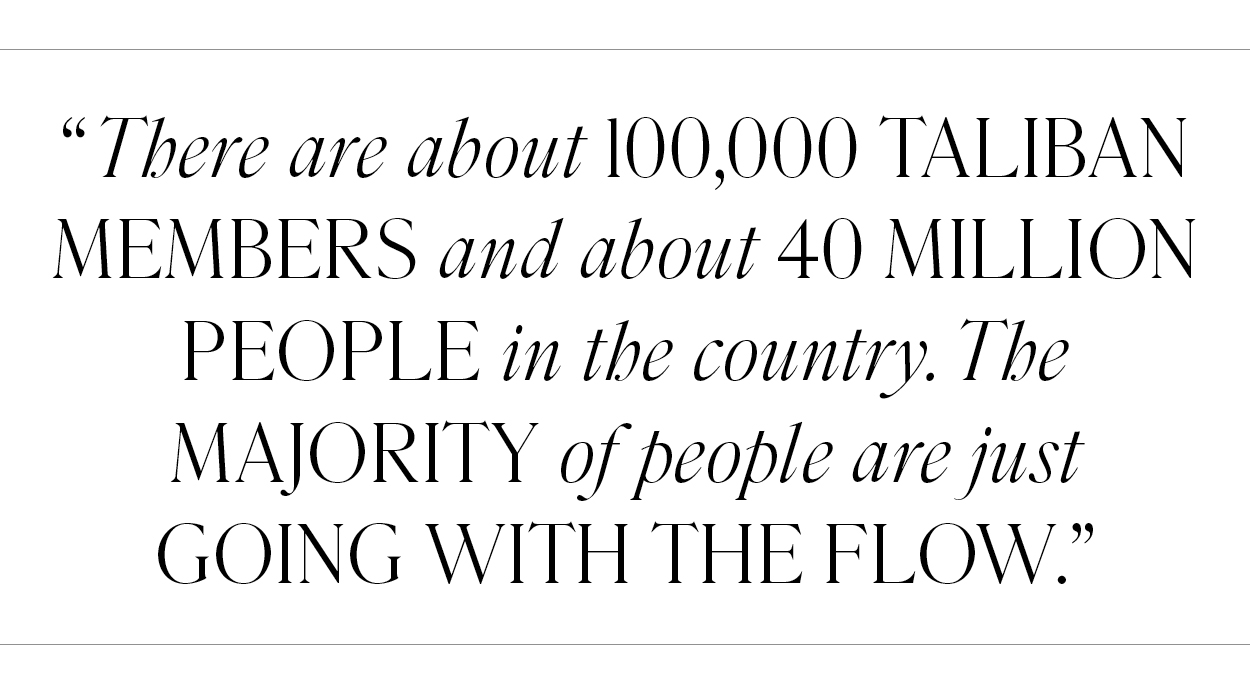
The biggest help in covering that first story [of the Taliban takeover] has been connections. I’m genuinely interested in the country and feel connected to a lot of the people in the mix of the story. I want to know them on a deep level, build trust, understand their motivations, what makes various actors tick — whether that’s the Taliban, the previous Afghan government or the Americans.
I’m quite pragmatic, which I didn’t realise before I started covering Afghanistan. I was surprised that I stayed calm under pressure. When the Taliban were entering Kabul, and all other TV networks evacuated, we were quite matter-of-fact, and said “let’s just take it step-by-step, make smart decisions, keep our heads down”, and that worked well. I think relationships and Al Jazeera’s longevity in Afghanistan play a big part in that. People are scared of what they don’t know.
For that first Taliban conference, I’d been messaging them earlier that day and at about 3:30pm they messaged saying, “get down to this building, there’s going to be a press conference at 6pm, see you then”. The English-speaking Taliban spokesman who was at the front of the room, I knew relatively well. We got there early, sat in the front row, and we decided to take the whole thing live. When they came into the room, my producer and I said, “we want to ask the first question and I want to ask about women’s rights”. And, I guess we took some initiative, and they were cool with it — so we got the first question.
I didn’t realise it was that significant at the time because I had been interviewing and communicating with them for a couple of years in Doha, where their leadership had been based during U.S. negotiations. For me, it was just another question — for the rest of the world, the perception was they’d just come out of caves and shown up at a press conference after 20 years. It surprised a lot of people to see that they were actually willing to let a woman speak, and answer in a semi-productive way.
It was genuine, but there are always qualifications. When they say they want to give women and girls rights, it’s within the framework of Islamic law. The previous government also ran under Islamic law but it depends on how strict your interpretation is, and when I pressed them on that in another interview they said they’re still negotiating that internally. That’s what everything hinges on. Many of the people they’ve put in power are hardliners from the 90s, so you can assume their interpretation will be very strict. But I have to add the younger generation Taliban leaders are much more amenable. They understand they need to find a middle ground between the old guard, representing highly conservative, rural Afghanistan, and modernising the country on all fronts. That’s an interesting tightrope to watch them walk.
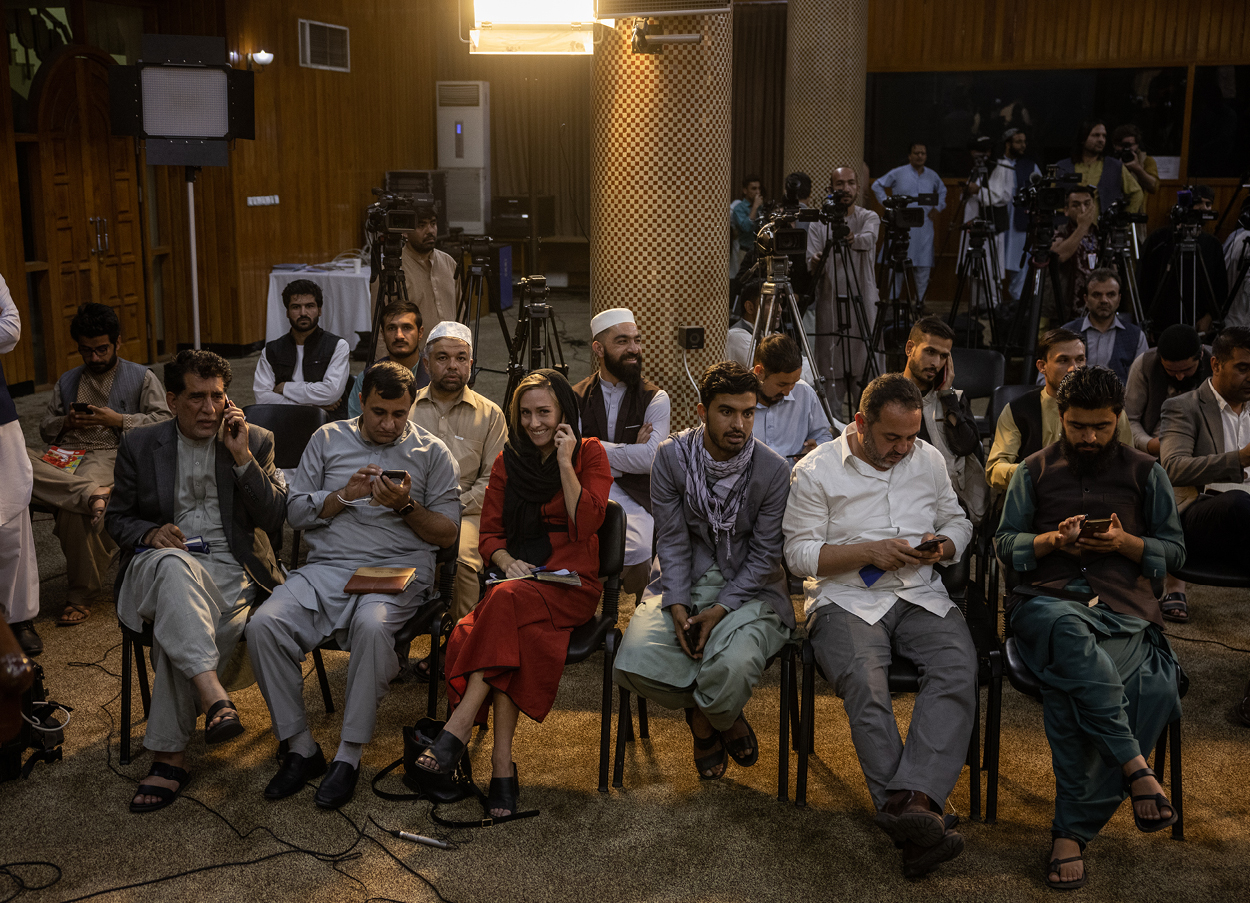
I’ve been surprised at how Western media have covered the story. I guess it’s because it hasn’t received much attention in recent years that most people think of the Taliban as an inhumane terrorist organisation that hate women and are allied with al-Qaeda. It’s a lot more complex than that. Like any movement, there are many different faces of the Taliban. The majority are under 30, just children during 9/11, and were sucked into a war and bound by a revolt against foreign occupation and collective revenge for their dead neighbours, sons or fathers. They love cricket, selfies and the first thing they did upon arrival in Kabul was eat ice cream. The conservatism the West associates with the Taliban does permeate the old guard at the top, but it is also deeply cultural, a rural dilemma, and not uniquely tied to the group. I went to plenty of villages in recent years that were in U.S./previous government-controlled areas, where girls had never gone to school because their elders were against it. Unfortunately, the current narrative is superficial, one-sided, with an abundance of hysteria from the perspective of those leaving or the previous government. What is missing is context, nuance and a willingness to understand the internal workings of the Taliban and Afghans outside of Kabul. I believe it’s a disservice to our understanding of what is really happening and how best to support the Afghan people.
I’ve had some of the Taliban round to my house in Doha, and we’ll sit and have dinner and we can have a debate. These are the younger members, the next generation of Taliban leaders and they’re happy to be challenged on their positions. They’ll add context to certain beliefs and say, “we’re lost as to why this particular act or statement is causing uproar in the West, can you help us understand?” One guy said to me, “well, four of my brothers were killed in drone strikes, separately, and I was imprisoned for five years in solitary confinement”. It makes you think, “okay, honestly if four of my siblings were killed in U.S. drone strikes and I was tortured for five years in my own country, where would I stand and how would I think?” As a journalist, you have to have an open mind and genuinely want to understand. It doesn’t mean on a personal level you agree with particular policies but you need to try to understand how their viewpoints came to be.
There are still guys who believe women should be stoned for adultery but then there are other guys who are very progressive and are happy for women to have full rights. They have grown up in the West, have smartphones and are quite happy to interact with me like any guy in New Zealand would. In fact, during the U.S. negotiations in Doha, there were diplomats in town consistently from not just the U.S., but Europe and the previous Afghan government also. I would meet with them all regularly and there was a common theme — the majority of diplomats were older men and flirtatious, often inappropriately so. When I met with the Taliban they were incredibly polite and respectful. One time, I made a passing complaint about the behaviour of some of the diplomats, to be told by one Taliban representative “we have heard how they act and we’re so sorry they put you in that position, just be careful and make sure you’re not alone with any of them”. I think back to that interaction often — who would have thought of all these Western leaders, it would be a Taliban member who offered me the most respect.
My typical day starts with waking up at the Serena Hotel, which is where most journalists and diplomats stay. It’s an oasis in the middle of Kabul with beautiful gardens and a buffet breakfast just like in any hotel — except when you go through the gates to exit, you walk past a dozen Taliban with machine guns. I say “good morning, how are you?” and they say “we’re fine” and I say “have a good day”. We have a driver, we go to work, call the Taliban or interpreters and touch base with different people about any developments, if we can expect a press conference, what’s the latest at the airport, anything that’s been ticking away. We go live on the latest news and then go out and film if there’s anything interesting. I usually finish around 7 or 8pm and then go home to the hotel, and order whatever I can find on the hotel menu that I haven’t already eaten, and go to sleep.
We have no security. To be honest, we haven’t really even talked about it. We’ve had the bureau there for more than 20 years, and there’s about 20 local staff, so for them, it’s just another day, except with another group in charge. If there’s ever going to be any security concerns, we talk about it as a team. At protests, for example, the Taliban were detaining journalists and beating them, so we made a decision to stay away.
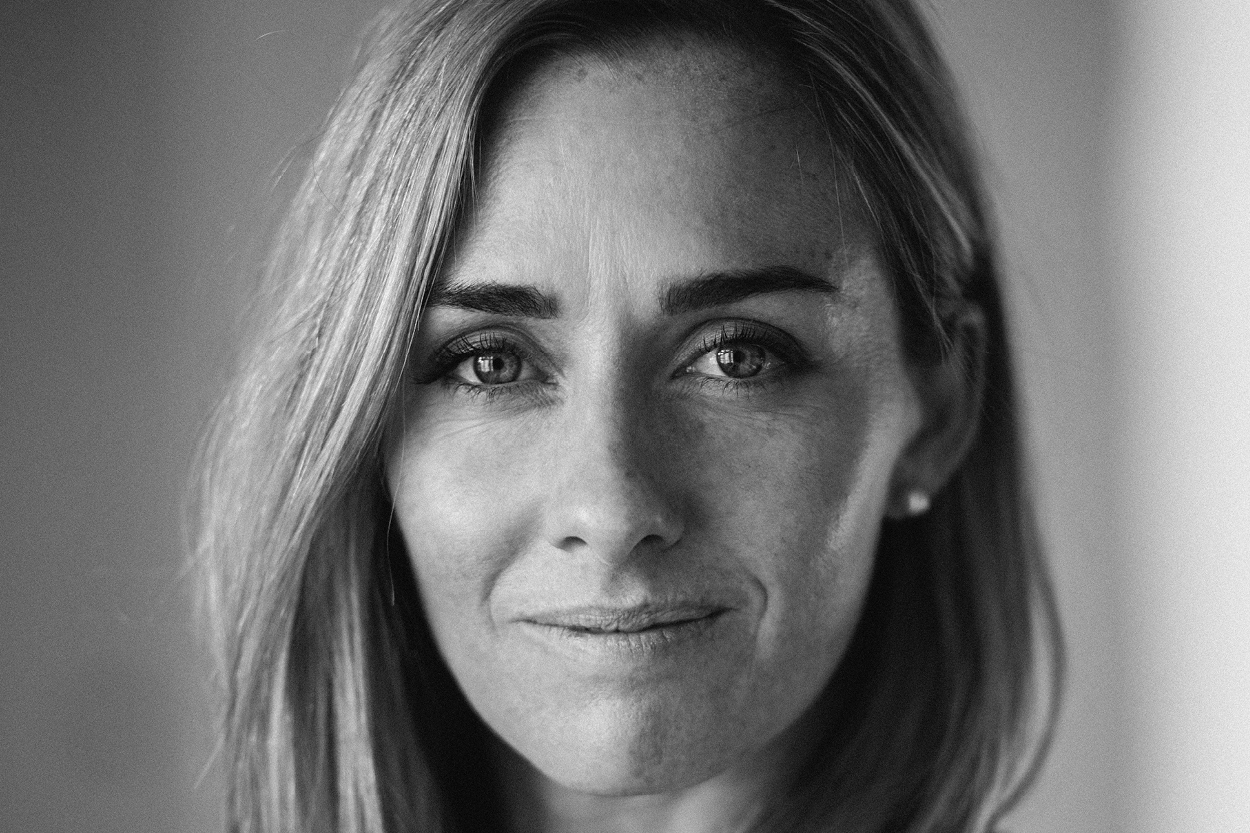
It’s actually safer now than before they took over, ironically, because it was the Taliban that was conducting attacks on Kabul. The only remaining threat is ISIS and the biggest problem with them is they may kidnap you, but we try to keep a low profile and move quickly — they usually target crowds, so we try to stay away from crowds. There are patterns where the risk goes up, and we’ve been working here for so long we can mitigate that fairly well. We haven’t had any issues since one of our cameramen was injured in an explosion a few years ago in an ISIS bombing. He survived, and that was the last time any of our staff were caught up personally in any kind of attack.
My career has been all over the show. I started off in the States and then my visa ran out so I came back to New Zealand. I was with TVNZ and Prime, and then I got laid off from Prime in 2014 — that was quite pivotal. I thought I either stay here, and work for another TV network as a reporter for the foreseeable future, or I give working for an overseas network another shot, because it had always been my dream and I was 27 at the time. So, I tried freelancing in New York for about a year and moved to London as a producer for Al Jazeera and the BBC.
I was in London freelancing for Al Jazeera the night the London Bridge attack happened. Our office was right next to London Bridge and a friend called me from the bridge and told me something strange was happening. I ran downstairs and got there as it was playing out, filmed everything on my phone before the police arrived and ducked back upstairs. I relayed everything to my colleagues and they asked me to co-anchor the next few hours as we rolled live on the story. After that, my boss gave me a promotion and moved me to Doha. As for Afghanistan, I just pestered them every second week until they let me go.
One of the most surreal things I’ve experienced in recent memory was standing on a rooftop with our team the day the Taliban entered Kabul. The U.S. embassy was directly behind us. I remember standing there as helicopters were streaming in and out, dozens and dozens of Black Hawks and Chinooks. Then, they had other helicopters firing heat flares to try and mitigate against any missiles being fired at the helicopters from the ground. Standing on the roof as these helicopters swooped above, firing heat flares with huge fires coming from the Embassy as they burnt documents. It was surreal to watch it play out in front of us, while knowing convoys of Taliban fighters were heading towards the city.
There have been everyday interactions where I expected the Taliban to be incredibly harsh with me, and they were not. I was on the back of a motorbike with my boyfriend, driving around Kabul. We’re not married and in the 90s that would not have been allowed. They pulled us over and a Taliban fighter said “good morning” in perfect English, and then he said, “I just wanted to introduce myself, I’m going to be looking after security in this neighbourhood. I just wanted to give you my number in case you guys ever have any issues and I might be able to help”. We thanked him and he said, “no problem, see you round”. I left wondering if an Afghan woman would have had the same reception.
Another time, I went to the airport and there were senior Haqqani members there who were still on terror watchlists. Their fighters said to me: “Do you want to see our new U.S. Humvee? We can teach you how to drive it!” They refused to take no for an answer. I told them “look, I don’t know how to drive a Humvee and I’m in high heels. If I run one of you over I imagine I’ll be in big trouble — so maybe another time”. I could just imagine the headline ‘Al Jazeera reporter runs over wanted terrorist in U.S. Humvee’.
As a Western woman, I’m somewhat of an enigma, and I don’t seem to fall under their restrictions. If I was an Afghan woman I think my experience would be vastly different. It’s an assumption because at the moment many Afghan women are just too scared to leave their homes, so I have little to judge myself against. Although, I have two Afghan female friends who are journalists and still charge around the country talking to Taliban, taking photos and videos, and have been welcomed. At the moment, I think the distinction probably comes in that I know I have recourse — NZ, Qatar and Al Jazeera would back me if there was a problem, but who would back them?
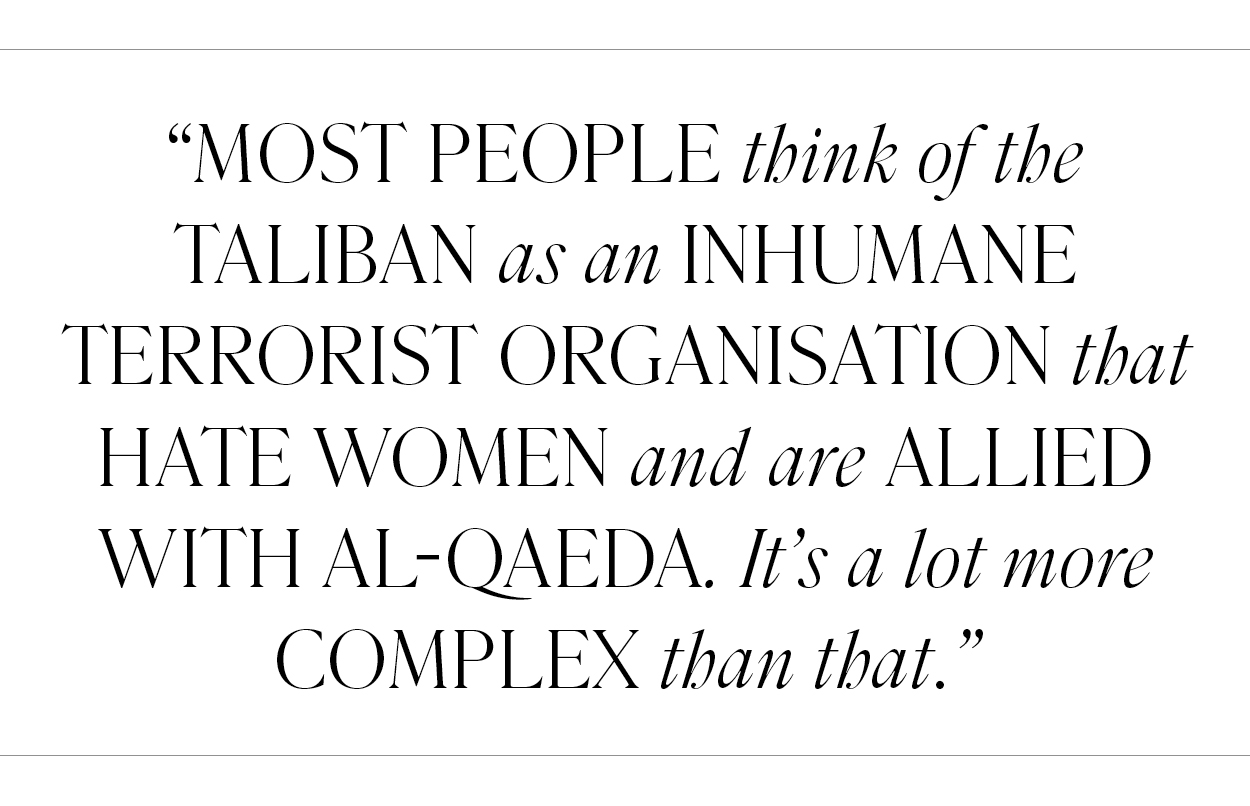
We go to hospitals often after bombings and attacks and it is moving to see how people rally together. There’s one trauma specialist centre that is run by an Italian NGO called ‘Emergency Hospital’, most people go there. Outside is a tall stone wall with a hand-painted sign saying ‘Emergency’ and some bench seats. The seats are packed with relatives sitting side by side with their backs against the wall, often waiting days for news of loved ones inside. The hospitals don’t let them in, so they sit, waiting to see if one of their relatives gets wheeled out or if they can get a message through a security guard to establish if their relative is even inside. When you talk to these people, the stories you hear are emotive and heartbreaking. I always find that grounding. It reminds me there is a lot of politics and who’s fighting who, but it’s here you see the true cost for everyday people. These people are butchers, taxi drivers or farmers, and they’re the ones that pay the biggest price but don’t have the power to change anything.
On a personal level, I hope I can keep doing what I’m doing now for many years. But, I do want to return to New Zealand and try to find some balance between working in places like Afghanistan and being with friends and family at home. I’m still struggling to do that at the moment, but I’m hoping as my career gets more established, I will get a little bit more flexibility with how I work and where I work.
For Afghanistan to have a better future, I think it’s not even up to the Taliban or Afghan people — it’s up to the international community. If we ostracise the Taliban, the only people that will suffer are poor and middle-class Afghans. We need to find a way to work with them, and essentially hold the Taliban’s hand to say, “we know you guys are passionate about Sharia law, but how about we look at something differently?” or, “we’ll do investment but we would like to invest in girl’s schools here and here, and then we can do some hydro-electric dams next to them”. Currently, the international community has cut off all funds. That means doctors aren’t getting paid in hospitals, they don’t even have paracetamol, food’s running out, prices are going up. Each morning hundreds of people wait outside ATMs hoping to get some cash out but there are limits in place, because the U.S. has frozen Afghan Reserve Bank funds and international transfers have largely ceased. Even though the West doesn’t want to work with the Taliban, they have to find a way, because it is poorer Afghans who are punished by the politics.
The Taliban does have some support in rural areas, but there are about 100,000 Taliban members and about 40 million people in the country. The majority of people are just going with the flow trying to put food on the table and trying to keep their kids healthy. It’s not fair on them to have another generation being punished for whoever is in power.
I’m most proud of being authentic and I really think New Zealand culture has a lot to do with that. My generation grew up seeing a lot of strong female leaders, yet still humility was championed. We have seen how the world should work — what free healthcare looks like, what it means to have comprehensive education and no corruption. If you take that as a foundation and go to a place without those things — you ask “how did this happen?” New Zealand has had an enviable list of foreign correspondents over the decades and I think the difference is we ask questions from a place of empathy and hope, not because we have something to gain.

